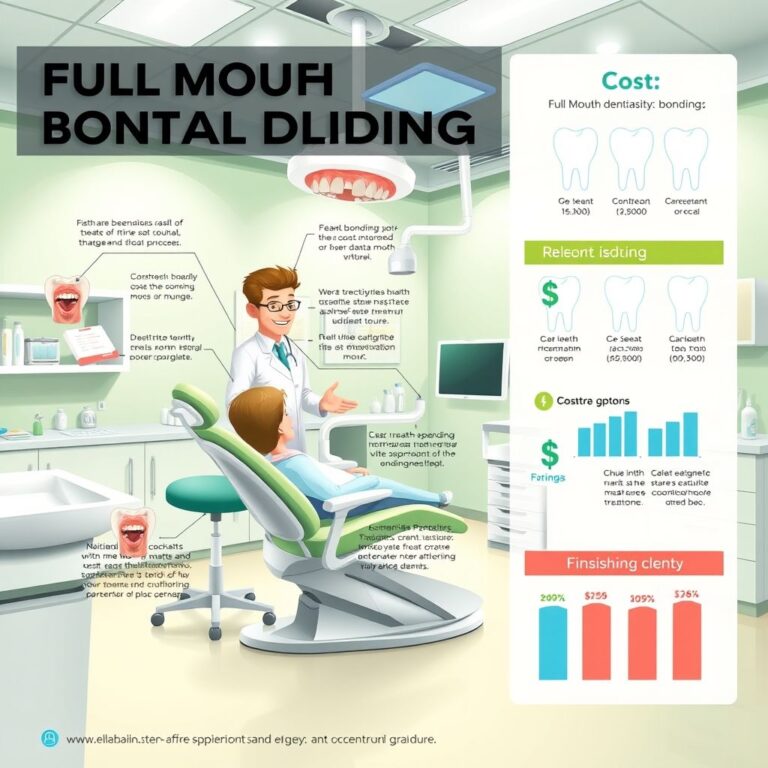A Comprehensive Guide to Dental Bonding Cost in Canada: Reclaim Your Smile with Confidence
For many Canadians, a dazzling smile is a significant part of feeling confident and put-together. But chipped, cracked, or discolored teeth can hold you back from expressing yourself fully. Thankfully, dental bonding offers a practical and versatile solution to restore the beauty and functionality of your smile.
This article delves deep into the world of Dental Bonding Cost in Canada, specifically focusing on the cost factors that influence the price tag. We’ll explore everything you need to know, from the procedure itself to the variables affecting its cost, potential insurance coverage, and additional resources to empower you to make informed decisions about your oral health.

What is Dental Bonding?
Dental bonding is a minimally invasive cosmetic dentistry procedure that utilizes a composite resin material to repair or enhance the appearance of teeth. The dentist skillfully sculpts and bonds the resin to the tooth’s surface, effectively creating a natural-looking restoration.
Here are some of the common applications of dental bonding:
- Repairing chipped, cracked, or fractured teeth
- Closing gaps between teeth
- Lengthening teeth
- Addressing minor tooth misalignments
- Replacing old or worn-out tooth fillings
- Improving the aesthetics of discolored teeth
The Advantages of Dental Bonding
Dental bonding offers several advantages over other cosmetic dentistry procedures, making it a popular choice for many Canadians. Here’s a glimpse into its benefits:
- Cost-effective: Compared to other options like veneers or crowns, dental bonding generally falls on the more affordable side of the spectrum.
- Minimal tooth removal: Unlike procedures like crowns, dental bonding requires minimal removal of the natural tooth structure, making it a more conservative approach.
- Quick and comfortable: The bonding process is typically completed in a single visit and is often less time-consuming than other cosmetic procedures.
- Natural-looking results: When performed by a skilled dentist, dental bonding can achieve a highly natural and aesthetically pleasing outcome.
- Versatile application: Bonding can address a variety of cosmetic dental concerns, offering a solution for various needs.
Understanding Dental Bonding Costs in Canada
The cost of dental bonding in Canada can vary depending on several factors. Here’s a breakdown of the key elements that influence the price:
- Complexity of the procedure: The extent of the repair or enhancement needed will significantly impact the cost. Simple repairs like closing a small gap will be less expensive than more complex procedures like building up a fractured tooth or filling multiple gaps.
- Amount of bonding material required: The amount of resin material used directly affects the price. More extensive repairs or cosmetic enhancements will naturally require more material, leading to a higher cost.
- Dentist’s experience and location: The dentist’s expertise and the geographical location of the dental practice can influence the cost. Experienced dentists in high-demand areas might charge more than those with less experience or in more rural locations.
- Dental consultation fees: While some dentists include consultation fees in the overall treatment cost, others might charge a separate consultation fee to discuss your specific needs and treatment plan.
Estimated Cost Range of Dental Bonding in Canada
| Procedure Complexity | Estimated Cost per Tooth (CAD) |
|---|---|
| Simple repair (chip, small gap) | $200 – $300 |
| Moderate repair (larger chip, moderate gap) | $300 – $400 |
| Complex repair (extensive fracture, multiple gaps) | $400 – $600+ |
It’s important to note that these are just estimated ranges. The actual cost of your bonding procedure will depend on the factors mentioned above.
Additional Cost Considerations:
- Anesthesia: Depending on your anxiety level and the complexity of the procedure, you might opt for local anesthesia to numb the area, which could add to the overall cost.
- Preliminary X-rays: If needed, X-rays to assess the tooth’s health and underlying structure might be factored into the cost.
Maximizing Savings with Dental Insurance
Fortunately, many dental insurance plans in Canada offer some coverage for dental bonding, particularly when the procedure is deemed necessary for repairing a damaged tooth. However, the extent of coverage varies significantly between plans.
Here’s what to keep in mind regarding insurance and dental bonding:
- Check your plan details: Carefully review your dental insurance policy to understand the coverage specifics for restorative procedures like dental bonding. Pay close attention to coverage percentages and annual maximums.
- Pre-approval might be required: Some insurance companies require pre-approval before undergoing the procedure to ensure it falls within your covered benefits. Contact your insurance provider to understand their pre-approval process.
- Out-of-pocket costs: Even with insurance, you might still be responsible for a portion of the cost
Alternative Financing Options
While dental insurance can be a valuable tool in reducing your out-of-pocket costs for dental bonding, it might not always cover the entire amount. Here are some alternative financing options to consider:
- Payment plans: Many dental practices offer in-house financing plans that allow you to spread the cost of your treatment over several months. This can make the procedure more manageable financially.
- Third-party financing companies: Several third-party financing companies specialize in medical and dental procedures. These companies offer various loan options with varying interest rates and repayment terms. Carefully research and compare terms before choosing a financing option.
- Credit cards: Using a credit card with a low-interest rate can be an option, but it’s crucial to have a clear plan to pay off the balance quickly to avoid accruing high-interest charges.
Important Considerations Before Choosing Dental Bonding
Before opting for dental bonding, it’s essential to consider some key factors:
- Durability: Compared to other cosmetic options like veneers or crowns, dental bonding generally doesn’t last as long. You might need to replace the bonding material every 5-10 years, depending on various factors like your habits and oral hygiene practices.
- Suitability for your needs: While bonding offers a versatile solution for various cosmetic concerns, it might not be suitable for all situations. Discuss the best course of action with your dentist based on the severity of your dental issue.
- Maintaining bonded teeth: Proper oral hygiene, including regular brushing, flossing, and professional dental cleanings, is crucial for maintaining the longevity of your dental bonding.
Finding a Qualified Dentist for Dental Bonding in Canada
Choosing a skilled and experienced dentist is vital for achieving optimal results with dental bonding. Here are some tips for finding the right dentist:
- Seek recommendations: Ask your friends, family, or physician for recommendations of reputable dentists with experience in cosmetic dentistry procedures like bonding.
- Research online reviews: Check online review platforms to see what other patients have to say about a dentist’s expertise and bedside manner.
- Consider qualifications and experience: Look for a dentist who holds a Doctor of Dental Surgery (DDS) or Doctor of Medicine in Dentistry (MDM) degree and has experience performing dental bonding procedures.
- Schedule a consultation: Schedule a consultation with the dentist to discuss your concerns, goals, and any anxieties you might have. This allows you to assess the dentist’s communication style and ensure you feel comfortable moving forward.
Conclusion
Dental bonding offers a cost-effective and versatile solution to restore the beauty and functionality of your smile. By understanding the factors influencing its cost, exploring potential insurance coverage, and carefully considering alternative financing options, you can make informed decisions about this dental procedure. Remember, choosing a skilled and experienced dentist is vital for achieving optimal results and maximizing the longevity of your dental bonding.
FAQs
Q: Does dental bonding hurt?
A: The bonding procedure itself is generally painless. However, your dentist might recommend local anesthesia to numb the area for more complex procedures or if you have any anxiety about dental work.
Q: How long does dental bonding last?
A: Dental bonding can typically last anywhere from 5 to 10 years, depending on various factors like the location and extent of the bonding, your oral hygiene practices, and habits like teeth grinding.
Q: Can I eat and drink normally after dental bonding?
A: You can resume eating and drinking normally after the bonding material has cured. However, it’s advisable to avoid hard, chewy, or sticky foods that could damage the bonding.
Q: What are some alternatives to dental bonding?
A: Depending on the severity of your dental concern, alternative options like veneers or crowns might be more suitable. Discuss the best course of action with your dentist based on your specific needs.
Additional Resources
- Canadian Dental Association: https://www.cda-adc.ca/
- The College of Dentists of Ontario: https://www.rcdso.org/en-ca/find-a-dentist
This comprehensive guide empowers you with the knowledge required to navigate the world of dental bonding costs in Canada. Remember, a dazzling smile is an investment in your confidence and well-being. By carefully considering all the factors discussed above, you can make an informed decision about achieving your dream smile with dental bonding.


